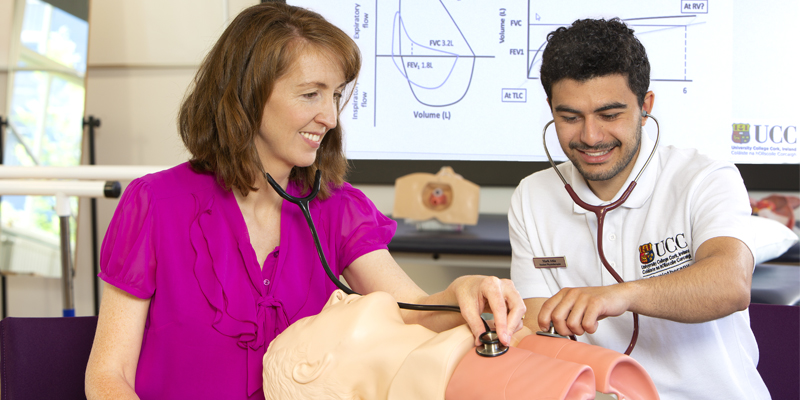In This Section
UCC researchers find that people with COPD see improved health benefits from lifestyle changes

- Research shows that people with the complex lung disease COPD see improved health benefits from behaviour change interventions.
- It is estimated that over 380,000 people in Ireland suffer from COPD.
- Interventions ‘has helped me greatly’ says woman with COPD.
Researchers at University College Cork (UCC) have found that people with Chronic Obstructive Pulmonary Disease (COPD) see health benefits and improved short-term quality of life from lifestyle behaviour change interventions.
COPD is a complex lung disease and the third leading cause of death in the world. It is a preventable and manageable disease in which people can present with cough, breathlessness and recurrent exacerbations. The World Health Organisation state that approximately 65 million people globally currently live with moderate to severe COPD and it is estimated that over 380,000 people in Ireland suffer from COPD.
Behaviour change interventions are activities developed to change specific behaviour patterns, for example goal setting, demonstration of a task, provision of information, prompts and rewards. Supporting positive changes in behaviour for people with COPD could help to promote a more physically active lifestyle.
In this review, led by Ciara Hanrahan, Lecturer in Physiotherapy and PhD candidate at UCC, behaviour change interventions were identified across 12 randomised controlled trials, included over 1200 participants, and results were mapped to a theoretical framework which provides a lens through which behavioural determinants can be observed.
Margaret O’Donoghue is a member of the Limerick COPD Support Ireland Group, and she has seen significant changes to her everyday life from making lifestyle behaviour interventions. "Since I joined COPD [Support Ireland group] approximately six years ago, it has benefited me in more ways than one. I was prone to chest infections and had to take antibiotics and steroids on a regular basis. I find that both the breathing and general exercising has helped me greatly. The social side of meeting up on a weekly basis has proven to be a great asset to us all. A lot of our members live alone, they look forward to meeting up each week, and they find regular exercise routine a great asset to their everyday life."
Adults with COPD are less physically active than those without COPD. The benefits of exercise for people with COPD are well-reported in the literature, but maintaining a physically active lifestyle can be challenging. The symptom burden of this disease can result in a downward spiral of inactivity due to breathlessness, cough and exacerbations.
Across a study of eight medical databases searched from inception to April 2023, outcomes including steps per day, physical activity levels, exercise capacity and quality of life were most measured. Behavioural change interventions most frequently reported across the studies were counselling, step-count monitoring, social support and goal setting.
While the optimal combination of behaviour change interventions, their dosage and timing of their delivery is not yet clear, this review reports that using behaviour change techniques incorporating counselling, activity monitoring, goal setting and social support interventions, such as group exercise, feedback from trainers, use of physical activity monitors in the form of pedometers, smart watches and apps may help to influence positive physical activity behaviour in the short-term.
This review also indicates that greater improvements in physical activity and quality of life outcomes in those with COPD may be achieved when multiple behaviour change interventions are used together, providing scope for future trials to examine the use of variously combined interventions over longer intervention periods. Published in the Journal of Respiratory Medicine and Research, the study found that where participants were exposed to a greater number of behaviour change interventions, greater improvements in physical activity and health-related outcomes were reported.
"It has been so useful to examine the literature in relation to behaviour change for physical activity in COPD. There is a growing popularity and attendance at local COPD support groups across Ireland, where people can meet with their peers and partake in exercise classes. This is reflected in our findings, where interventions such as social support, activity monitoring and goal setting can help people with COPD to stay active," said Ciara Hanrahan.
Dr Joseph McVeigh, Head of Discipline of Physiotherapy at UCC said: “This is an excellent piece of research which highlights the challenges people with COPD have engaging with physical activity. Ciara’s work has demonstrated the benefits of some relatively simple, but extremely important, behaviour change interventions can have in improving physical activity in people with COPD. Ciara’s work should have an impact on clinical practice for people working in this field both nationally and internationally.”
